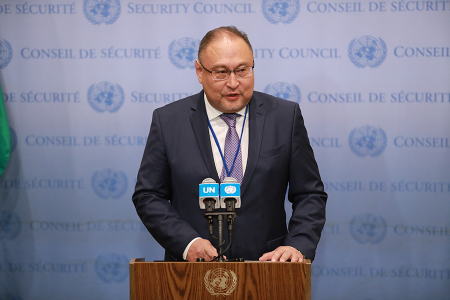"The Arms Control Association’s work is an important resource to legislators and policymakers when contemplating a new policy direction or decision."
States-Parties Prepare to Confront Challenges to NPT
July/August 2024
By Shizuka Kuramitsu
Amid persistent high tensions among major nuclear-armed nations, states-parties to the nuclear Nonproliferation Treaty (NPT) are bracing for a challenging second preparatory committee meeting ahead of the 2026 NPT Review Conference.

The 191 states-parties to the NPT will gather July 22-Aug. 2 in Geneva to review implementation of the landmark 1968 treaty and seek to develop a forward-looking action plan on its key components of nonproliferation, disarmament, and peaceful uses of nuclear energy.
The preparatory meetings focus on making recommendations and advancing substantive debate on key subjects ahead of the review conferences, which are the main vehicle for assessing treaty performance and prodding states-parties to carry out their NPT-related obligations.
After two consecutive failures to adopt substantive outcome documents by consensus at the last review conferences, in 2015 and 2022, the political pressure to ensure a successful outcome at the 2026 conference is high.
Meanwhile, divisions between some NPT states-parties have intensified and played out in many multilateral nuclear-related meetings, such as the first preparatory committee meeting in 2023 and last month’s International Conference on Nuclear Security. (See ACT, June 2024, September 2023.)
One issue that analysts and diplomats expect the preparatory committee meeting to debate concerns the absence of dialogue between Russia and the United States and China and the United States on nuclear risk reduction and arms control as they accelerate efforts to fortify their respective nuclear arsenals.
Article VI of the NPT obligates states-parties to engage in good faith negotiations to halt the arms race and achieve disarmament. Thus far, Russia has rejected a U.S. proposal to negotiate a successor to the New Strategic Arms Reduction Treaty (New START), which expires in 2026. China has declined U.S. overtures for further talks on nuclear risk reduction. (See ACT, June 2024.)
“All parties to the [NPT] must start collaborating now to ensure consensus at the review conference in 2026. All countries need to step up, but nuclear-weapon states must lead the way,” UN Secretary-General António Guterres said in a June 7 video message to the Arms Control Association annual meeting. In particular, the NPT nuclear-armed states “must accelerate the implementation of the disarmament commitments” made under the NPT, he said.
For the Biden administration, the “highest priority” at the preparatory committee meeting is to “continue... to preserve the authority and integrity of the NPT,” Adam Scheinman, special U.S. representative for nonproliferation, told Arms Control Today on June 29.
“[W]e will advocate for a constructive agenda on nuclear disarmament, to include support for bilateral dialogues with Russia and ... China, for the long-overdue fissile material cutoff treaty, and for greater transparency among parties,” he wrote.
Scheinman outlined modest goals, saying that although Washington hopes to “identify areas of convergence ... there are no plans (for the NPT nuclear-armed states) to issue a joint statement.”
Experts’ concern about the ability of states-parties to fulfill their NPT obligations is echoed in multiple forums.
If “[s]tates-parties who have been the custodians of the treaty [and] whose agreement was always key to achieving an outcome…are not in a position to conduct a dialogue directly, what is our road to a substantive outcome in 2026?” Gaukhar Mukhatzhanova of the Vienna Center for Disarmament and Nonproliferation asked on May 21. She also stressed the role to be played by bridge-building states and coalitions.
Another theme that may feature heavily at the preparatory committee meeting includes nuclear safety and the security dangers posed by Russia’s continued occupation of Zaporizhzhia Nuclear Power Plant in Ukraine. It was Russia’s objection to language in the draft 10th NPT Review Conference document relating to Ukraine’s sovereign control of that facility that led Moscow to block consensus on a final conference document
in 2022.
Nuclear sharing arrangements between the United States and its NATO allies, coupled with Russia’s forward deployment of some of its nonstrategic nuclear weapons in Belarus and recent exercises involving its battlefield nuclear weapons, also will be a likely source of contention.
To tackle these and other divisions, Akan Rakhmetullin, Kazakhstan’s deputy foreign minister and chair-designate of the 2024 meeting, held consultations with states-parties, experts in the field, and civil society organizations ahead of the second preparatory committee meeting.
On May 21, he said he feels that all parties understand what their differences are on key issues but they diverge on how to overcome those differences. The outcome of preparatory committee meeting will depend on the political will of participants “and their willingness to work together and readiness for compromise,” he said.
